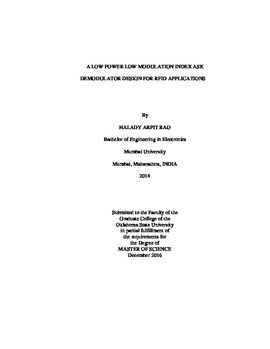| dc.contributor.advisor | Hutchens, Chris | |
| dc.contributor.author | Rao, Halady Arpit | |
| dc.date.accessioned | 2018-06-29T14:41:07Z | |
| dc.date.available | 2018-06-29T14:41:07Z | |
| dc.date.issued | 2016-12-01 | |
| dc.identifier.uri | https://hdl.handle.net/11244/300369 | |
| dc.description.abstract | In the era of the Internet of Things (IoT) there is a tremendous increase in portable wireless devices utilized in our day to day working. One such example is the Radio Frequency Identification tag. The primary challenge in designing passive RFID tags is reliable functionality over extreme temperature and environmental conditions with low power operation. An important component of the RFID tag architecture is the demodulator which is tasked with interpreting the incoming data and extracting the reference clock for the Phase Locked Loop. A novel ASK demodulator architecture that functions across a temperature range of -25? to 125? is designed, analyzed and optimized for the worst and best case semiconductor process variations. The incoming RF frequency is selected as 900MHz based on the EPC GEN2 protocol and the baseband signal is set at 450 KHz with a modulation index of 5%. MOS transistor operation and variability in semiconductor processes is explored and a better understanding of how these concepts effect and shape our design decisions is established. A design objective is setup and steps to achieve these design objectives are presented. The design of the ASK demodulator is completed with the help of the Cadence Virtuoso tool, utilizing the IBM 0.18µm (CMOS 7RF) process. In order to test our design we have used the Monte Carlo analysis and all the significant DC parameters of the design have been tested for 10,000 samples owing to the high variability associated with modern semiconductor processes. On the other hand Monte Carlo simulations for the transient simulations have been done for 30 samples in accordance with the Central Limit Theorem. The results of the design are compared with other ASK RFID demodulator designs in the past and a comparison is made by utilizing a Figure of Merit from literature. The design is among the best ASK demodulator designs found in literature. Throughout this effort there is emphasis on MOS transistor operation and variations in semiconductor processes. The design takes all pertinent challenges such as extreme temperature, environment conditions and the reliability of the design. Through this work an attempt is made to try and simplify the work of the reader and expose them to the challenges associated with ASK demodulator design. | |
| dc.format | application/pdf | |
| dc.language | en_US | |
| dc.rights | Copyright is held by the author who has granted the Oklahoma State University Library the non-exclusive right to share this material in its institutional repository. Contact Digital Library Services at lib-dls@okstate.edu or 405-744-9161 for the permission policy on the use, reproduction or distribution of this material. | |
| dc.title | Low Power Low Modulation Index Ask Demodulator Design for RFID Applications | |
| dc.contributor.committeeMember | West, James | |
| dc.contributor.committeeMember | Hagan, Martin | |
| osu.filename | RAO_okstate_0664M_14961.pdf | |
| osu.accesstype | Open Access | |
| dc.description.department | Electrical Engineering | |
| dc.type.genre | Thesis | |
| dc.type.material | text | |
